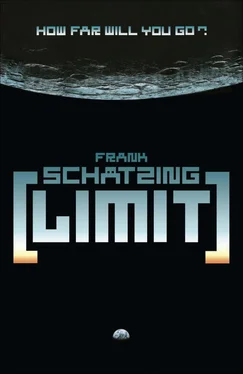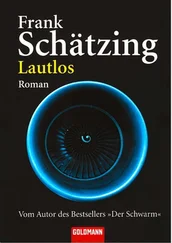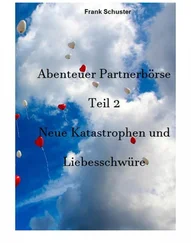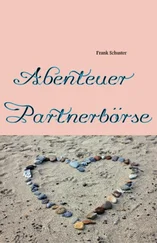She stretched, did a somersault and decided to go – float, rather – to breakfast. In the concave wall that seemed to conceal the life-support system, there was a wardrobe from which she chose a pair of dark three-quarter-length trousers and a matching T-shirt and tight-fitting slippers. She paddled over to the bulkhead and said, ‘Evelyn Chambers. Open.’
The computer tested pressure, atmosphere and density, then the module opened to reveal a tube several metres across. Many miles of such tubes stretched all the way across the station, connecting the modules to one another and with the central structure, and creating lines of communication and escape routes. Everything was subject to the redundancy principle. There were always at least two possible ways of leaving a module, each computer system had matching mirror systems, there were several copies of the life-support systems. Months before the trip, Evelyn had tried to imagine the massive construction by studying it using models and documents, before establishing, as she had now, that her fantasy had been blinding her to the reality. In the isolation of the cell in which she was staying, she could hardly imagine the colossus that loomed above it, its size, its complex ramifications. The only thing that was certain was that next to it the good old ISS looked like a toy out of a blister pack.
She was on board the biggest structure in space ever created by human beings.
In homage to the concept of the space elevator, the designers had built the OSS on a vertical. Three massive steel masts, each one 280 metres high, arranged at an equal angle to each other, formed the spine, connected at the base and the head, producing a kind of tunnel through which the cables of the lift passed. Like the storeys of a building, ring-shaped elements called tori stretched around the masts, defining the five levels of the facility. At the bottom level lay the OSS Grand, the space hotel. Torus-1 housed comfortable living rooms, a snack and coffee bar, a room with a holographic fireplace, a library and a rather desperate-looking crèche, which Julian stubbornly planned to extend: ‘Because children will come, they will love it!’ In fact, since its opening two years previously, although the OSS Grand had been well booked, there had so far been no families. Very few people were willing to entrust their offspring to the weightless state, a fact that Julian defiantly dismissed by saying, ‘Nothing but prejudice! People are so silly. It’s no more dangerous up here than it is in the stupid Bahamas, quite the contrary. There’s nothing up here to bite you, you can’t drown, you don’t get jaundice, the natives are friendly, so what is there to worry about? Space is paradise for children!’
Perhaps it was just that people had always had a twisted relationship with paradise.
Like a predatory shark, Evelyn snaked her way along the pipe. You could move incredibly quickly in zero gravity if you put your mind to it. On her way she passed numbered side-tunnels, with suites similar to her own behind them. Every unit consisted of five modules, each divided into two living units and arranged in such a way that all the guests enjoyed an unimpeded view of the Earth. The connection to the torus branched off to the right, but Evelyn fancied breakfast, and continued along the course of the tunnel. It opened out into the Kirk, one of the two most spectacular modules of the OSS. Disc-shaped, these protruded far above the accommodation areas, so that Earth could be seen through the glass floor. The Kirk served as a restaurant; its counterpart to the north, appropriately christened the Picard, alternated between lounge, nightclub and multimedia centre.
‘Making this glass floor stretched us to the limits,’ Julian never tired of stressing. ‘What a struggle! I can still hear the builders’ complaints in my ears. So? said I. Since when have we cared about limits? Astronauts have always yearned for windows, lovely great big panoramic windows, except that the walls weren’t strong enough on the flying sardine-tins of the past. The problem was solved with the lift. We need mass? Send it up there. We want windows? Let’s put some in.’ And then, as he always did, he lowered his voice and whispered almost reverently. ‘Building them like that was Lynn’s idea. Great girl. She’s pure rock ’n’ roll! I tell you.’
The communication hatch leading to the Kirk was open. Evelyn remembered the hazards of her newly won freedom too late, clutched at the frame of the lock to halt her flight, missed it and flew through, flailing her arms, past a not especially startled waiter. Someone grabbed her ankle.
‘Trying to get to the Moon all by yourself?’ she heard a familiar voice say.
Evelyn gave a start. The man drew her down to eye-level.
His eyes—
Of course she knew him. Everyone knew him. She’d had him on her show at least a dozen times, but she still couldn’t get used to those eyes.
‘What are you doing here?’ she exclaimed, bewildered.
‘I’m the evening entertainment.’ He grinned. ‘What about you?’
‘Morale booster for space grouches. Julian and the media, you know…’ She shook her head and laughed. ‘Incredible. Has anyone seen you?’
‘Not yet. Finn’s here, I heard.’
‘Yeah, he was suitably dismayed to bump into me here. He’s become quite trusting now though.’
‘No pose is a pose in itself. Finn enjoys playing the part of the outsider. The less you ask him, the more answers you’ll get. You up for breakfast?’
‘Definitely.’
‘Great, me too. And then?’
‘To the multimedia centre. Lynn’s giving us an introduction to the station. They’ve divided us up. Some people are having the scientific aspect explained to them, the others are going out to play.’
‘And you aren’t?’
‘No, I am, but later. They can only take six people out at any one time. You fancy coming?’
‘I’d love to, but I’ve got no time. We’re shooting a video in Torus-4.’
‘Oh, really, you’re doing something new? Seriously?’
‘Not another word.’ He smiled, putting a finger to his lips. His eyes whisked her off to another galaxy. ‘Remember, someone has to take care of the old folks.’
* * *
Lynn smiled, answered questions, smiled again.
She was proud of the multimedia space, just as she was intensely proud of the whole OSS Grand, of the Stellar Island Hotel and the far-away Gaia. At the same time they all filled her with terrible anxiety, as if she had built Venice on matchstick foundations. Everything she did was affected by that awareness. She tortured herself with apocalyptic scenarios, and catharsis was possible only if her worst fears proved to be well founded. She was trapped in a terrible internal struggle, in which she tirelessly pursued another version of herself. The more arguments she produced to quell her anxieties, the bigger they became, as if she were approaching a Black Hole.
I’m going to lose my mind, she thought. Just like Mom. I’m definitely going insane.
Smile. Smile.
‘Lots of people see OSS as a mushroom,’ she said. ‘Or a parasol, or a tree with a flat crown. A bar table. Other people see a medusa.’
‘What’s a medusa again, darling?’ asked Aileen, as if talking about some kind of fashionable gewgaw that teenagers might be interested in.
‘It’s a sort of jellyfish thing,’ Ed Haskin replied. ‘You’ve got this gooey umbrella thing at the top, with tentacles and other sorts of gooey stuff dangling from the bottom.’
Lynn bit her lips. Haskin, previously a director of the spaceport and for a few months now responsible for the whole technical sector, was a nice man, very competent, and sadly equipped with the sensitivity of a Neanderthal.
Читать дальше












